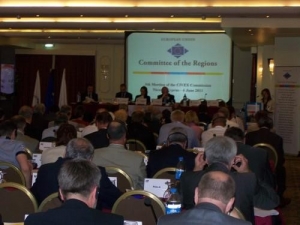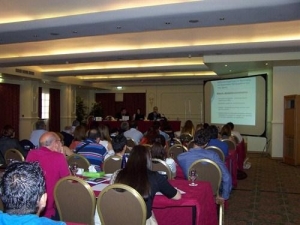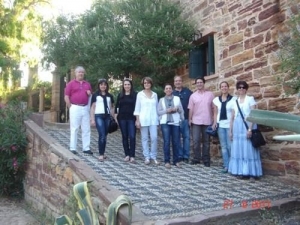The Committee of the Regions’ CIVEX commission meets in Nicosia – 08/06/2011
All levels of government working together to promote the concept of European citizenship and dialogue between civil society and the EU
08.06.2011 – The Committee of the Regions’ CIVEX commission (Commission for Citizenship, Governance, Institutional and External Affairs) held its ninth meeting and a seminar on “The role of local and regional authorities in fostering European citizenship” on 6 and 7 June 2011 in Nicosia, Cyprus. Luc Van den Brande, president of the Flanders-Europe Liaison Agency and former president of the Committee of the Regions, chaired these events. The meeting and seminar were attended by representatives of local and regional authorities from the 27 EU Member States and of course members of the Cypriot delegation.
The two events took place at the invitation of Eleni Loukaïdou, Nicosia Municipal Councillor and member of the Cypriot delegation to the Committee of the Regions. She noted that 2011 was the Lisbon Treaty’s second year in force. One of its aims was to establish the area of freedom, security and justice and to revive external relations. Decentralised cooperation and city diplomacy were tools that could help to secure peace and understanding between peoples, and local and regional authorities were by their nature best placed to underpin initiatives for coexistence and reconciliation between states and peoples.
At the CIVEX meeting, members discussed four opinions, covering “smart regulation”, reducing bureaucracy for citizens and the strategy for effective implementation of the Charter of Fundamental Rights, as well as the CoR’s own-initiative opinion on the broader issue of developing a European culture of multilevel governance, whose rapporteur was the commission’s chair, Mr Van den Brande. The meeting closed with a study visit to Nicosia’s Multipurpose Centre organised by the Union of Cyprus Municipalities, and a walk through Nicosia’s historic city centre, including a fact-finding visit to Ledra Street, which was once divided by the Green Line. The CoR’s main reception and exhibition space at its Brussels headquarters was named after this place at an event on 3 April 2008 when a street sign with the words “Open Ledra Street” was erected to remind the thousands of visitors who regularly pass by the spot that local and regional authorities succeed when they have the support of local communities.
The seminar took place on Tuesday 7 June, and included European speakers and experts on citizenship. Guest of honour was the Interior Minister of Cyprus, Neoklis Sylikiotis. In his speech he underlined that the rights of European citizens would be one of the main priorities of the Cypriot presidency in the second half of 2012. European integration could not succeed without active citizens, and local government must be an equal partner in the exercise of public power.
In his opening speech, Luc Van den Brande stressed that the concept of European citizenship was evolving and was especially important in the process of founding “European municipalities”. The meaning of citizenship was no longer one-dimensional: national and European citizenship were flanked by regional, local and cultural notions of identity. Active participation in political dialogue started above all at grassroots level. In Europe’s villages, towns, cities and regions, citizens were aware of the issues that were of key importance to everyday life and citizens played a fundamental role in finding effective solutions to common problems. Mr Van den Brande reiterated that Europe could only be built on the basis of harmonious and effective cooperation between all stakeholders, above all local and regional authorities.
In her video message, European Commissioner Viviane Reding noted that Europe could not be built on legislation and rules alone, but relied on active citizens. She affirmed the European Commission’s commitment to close cooperation with the CoR and local and regional authorities.
The seminar centred on various measures taken by official bodies and local authorities in the EU and explored practices used by local and regional authorities to bring citizens closer to the European Union. More specifically, there was a presentation of the Nicosia Master Plan by its authors, Lelos Dimitriadisand Mustafa Akinci.
Events also included a visit to the Famagusta Museum, in Dherynia, near the Green Line. CIVEX commission members met with the Mayor of Famagusta, Alexis Galanos.
The Committee of the Regions
The Committee of the Regions is the EU’s assembly of regional and local representatives. The mission of its 344 members from all 27 EU Member States is to involve regional and local authorities and the communities they represent in the EU’s decision-making process and to inform them about EU policies. The European Commission, the European Parliament and the Council are obliged to consult the Committee in policy areas affecting regions and cities. It can appeal to the EU Court of Justice if its rights are infringed or it believes that an EU law violates the subsidiarity principle or fails to respect regional or local powers. For more information: www.cor.europa.eu.



